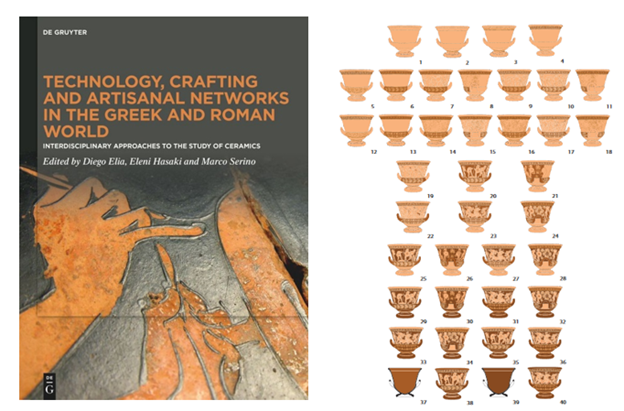
Eleni Hasaki together with Diego Elia and Marco Serino from the University of Turin just published a co-edited volume on Technology, Crafting, and Artisanal Netwoks in the Greek and Roman World with DeGruyter. This peer-reviewed volume aims to merge theoretical models with methodological approaches on ceramic technology and artisanal networks in the Classical world. This convergence of analytical frameworks allowed scholars to explore some traditional archaeological topics that usually have a very low-level of visibility, such as the skillful gestures of the craftspeople involved, the organization of the ceramic production, the dynamics of apprenticeship and knowledge transfer as well as intra and inter-regional artisanal mobility, in the Graeco-Roman ‘communities of practice’. The 31 papers by 52 scholars promote interdisciplinary dialogues among various fields of study, such as archaeology, archaeometry, anthropology, ethnoarchaeology, experimental archaeology, and digital humanities - such as Social Network Analysis, computational imaging, and big data analysis.
This volume and the international conference co-organized by the University of Turin and the University of Arizona in Turin (October 2022) are part of a wider spectrum of student engagement (featured in the UA News), webinars, conference papers, research projects, and outreach initiatives performed at the Laboratory for Traditional Technology in conjunction with the European Commission funded project A.G.A.T.H.O.C.L.E.S. (Marie Sklodowska-Curie Global Action no. 893629; PI: Marco Serino, University of Turin). The A.G.A.T.H.O.C.L.E.S. project and the University of Arizona Provost’s Author Support Grant supported the publication of the volume.
Eleni Hasaki, the US supervisor of the project (2022-2024), co-edited the volume and contributed three chapters: The A.G.A.T.H.O.C.L.E.S. Project and Beyond: Archaeology of Gesture and Material Consciousness in Ceramic Studies (Serino, Elia, Hasaki); Timing Euxitheos and Euphronios: Energetics and the Scale of Production in the Athenian Potters’ Quarters (Hasaki); Greek and Roman Ceramic Producers: Operational Knowledge and Networked Mobilities (Hasaki, Serino, Elia).
